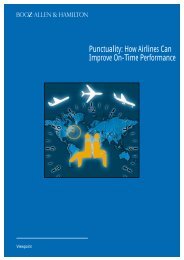The sentence
The sentence
The sentence
Create successful ePaper yourself
Turn your PDF publications into a flip-book with our unique Google optimized e-Paper software.
Two meanings of ‘too’<br />
Too changes its meaning according to position:<br />
This coffee is too hot to drink at the moment. (= more than is desirable)<br />
This croissant is freshly-made and the coffee is hot, too. (= also)<br />
‘Too’ and ‘not either’<br />
We use too at the end of an affirmative <strong>sentence</strong> to mean also:<br />
Billy can already read and he can write, too.<br />
In the negative, we must use either in place of too:<br />
Billy can’t write yet and he can’t read, either. (Not *He can’t read, too.*)<br />
‘Also’ and ‘as well’<br />
1. We use also and as well like too, that is in affirmative <strong>sentence</strong>s. We replace them by<br />
either in negative <strong>sentence</strong>s. We use as well only at the end of a clause or <strong>sentence</strong>:<br />
I bought this handbag and I bought these shoes to go with it, as well.<br />
2. Also is more common in writing than in speech. It normally comes:<br />
- after be, have, can, etc.: Susan is an engineer. She is also a mother.<br />
- after the first auxiliary verb when there is one or more than one:<br />
I should have collected the letters from your office and I should also have posted<br />
them.<br />
- before the main verb: I play volley-ball and I also play tennis.<br />
H. Viewpoint adverbs, connecting adverbs and inversion<br />
Viewpoint adverbs<br />
We may express our ‘viewpoint’ in speech or in writing using adverbs like these:<br />
- (= I’m sure): clearly, definitely, honestly, naturally, obviously, really, strictly speaking.<br />
- (= I’m going to be brief): anyhow, briefly, in brief, in effect, in a few words, in short.<br />
- (= I’m expressing my opinion): as far as I’m concerned, frankly, in my opinion, I think.<br />
Connecting adverbs<br />
We can connect ideas in speech or writing using adverbs like these:<br />
- (= I’m adding something): in addition, again, apart from this, besides, moreover.<br />
- (= I’m comparing/contrasting): as compared to, equally, however, in reality.<br />
- (= I’m summarizing): all in all, and so on, essentially, in brief, in conclusion, in effect.<br />
Inversion after ‘negative adverbs’, etc.<br />
1. Some adverbs like never and little have a ‘negative effect’ and we sometimes refer to<br />
them as ‘negative adverbs’. We can use them in the ordinary way:<br />
I have never seen so much protest against a government.<br />
Michael little realizes how important this meeting is.<br />
44




